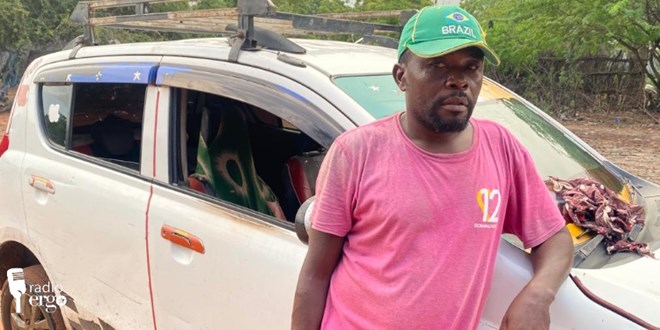[ad_1]

Thursday November 23, 2023

Former Jilib farmer Abukar with his taxi in Hagadera camp/Bashir Gahnug/Ergo
(ERGO) – Abukar Mohamud Abdullahi, a Somali refugee living in Dadaab, was once a happy farmer in southern Somalia’s bountiful Middle Juba region. For years now he has been hustling to support his family as aid in the camps has steadily dwindled.
Today he runs a taxi service in Hagadera camp, northeastern Kenya, having started out as a handcart operator, hiring a handcart to use for 30 shillings a day.
After some years of saving, he bought his own handcart. With his earnings from that over two years and eight months, he collected $2,500 and bought a car.
His business now provides an income for his wife and 12 children, including food and school fees.
“The aid distributions we get are not enough, so we try to get alternative sources of income to supplement the aid. When we get food and you bring it home, you need vegetables and more food. So I use my own income to buy sugar, milk, meat, tomatoes, potatoes and other groceries,” Abukar said.
“I always think of ways of improving my work and creating other avenues of getting income. My dream was to get a decent living for my children.”
Abukar has six children in Koranic school and four older children in primary school, paying $20 a month for their education. He offers transport services for passengers and goods, making $150 to $200 and saving about $20 a month.
“I’ve been planning to replace my car that is getting old with a new car. But now due to high inflation it is hard to get there,” said Abukar, who has his sights set on his next advancement.
The family receives $30 cash and 38 kilograms of sorghum a month from aid organisations. The taxi business cushions them from the harsh conditions that prevail for other families in the camp without any additional income.
“I advise people to work hard so they can realise their ambitions and help their families. I am urging them to never give up. Even if you save 20 shillings it will grow,” he said.
Abukar joined the refugee camp in 2008 after fleeing his farm in Jilib, Middle Juba, due to insecurity. He said he was forced to seek asylum in Kenya after his uncle with whom he co-owned their 20 hectare farm was killed by armed militia.
“I loved my farm very much. It was enough for us, it had everything. I left the area because of insecurity, when I speak to the people they say that there is still insecurity and I can’t go back. I saw my uncle get killed in front of me. I felt very sad and that is why I am still here,” he explained.
There are few job opportunities in Dadaab refugee camps and diminishing amounts of aid.
[ad_2]
